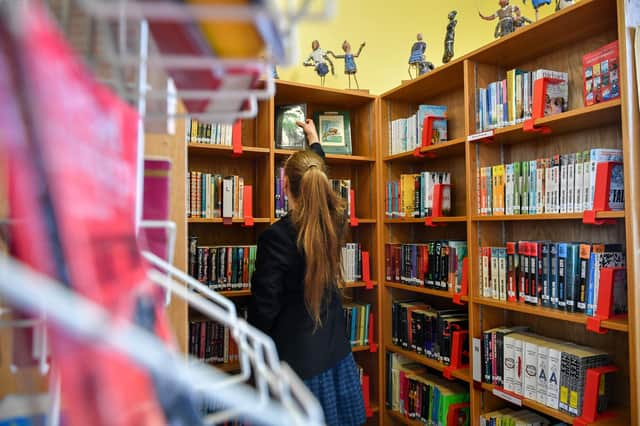Scottish education: As a former private school headteacher, axing state school librarians while employing police officers sounds crazy – Cameron Wyllie


The effect of this, I admit, is that periodically aspects of contemporary Scottish state educational practice spring out and hit me between the eyes. My life’s a constant series of surprises when it comes to what passes for education ‘policy’.
I have to confess, for example, that I only found out recently that there are police men and women permanently based in some Scottish schools. And, it turns out, there have been since 2002, meaning that the police presence in our schools is celebrating its 20th anniversary, with, I believe, 92 officers now so operating.
Advertisement
Hide AdAdvertisement
Hide AdI found this out because anti-racism campaigners have been suggesting that such a presence contributes to racism in schools. I can’t really comment on that, but am I alone (or simply weird) in thinking that the very presence of police in a school begs the question – yet again – of what our schools are for? I’m sure that the police who work in schools are specially selected for their communication skills; I’m sure that they make a great contribution in at least trying to proactively prevent criminality in our young people; as to whether they succeed or not, I obviously can’t say – because I didn’t even know they were there.
Contrast this with the news that North Lanarkshire Council has just axed all its school librarians. That also seems very odd indeed to me, as a former teacher of English, someone who, over the decades, really appreciated the work done by the librarians in the schools in which I worked.
Librarians are rarely the flashiest of people, working away, trying to think of inventive ways of encouraging young people to read more and more; helping them research their individual projects and essays; and, as different means of electronic learning come on board, adapting to their new role in information technology.
Few groups of people working in schools have been as adaptable as librarians over the past 50 years, and I imagine they were very helpful when all teachers were recently expected to become online gurus at very short notice by a Scottish Government which expected them not only to be dedicated child-centred professionals but also magicians.
At the very lowest rung of expectation, isn’t it good for schools to have people there whose central concern is reading? At one time, we saw reading as rather a useful skill to have as one was being educated but that, of course, probably just marks me down as a dinosaur. Honestly, just tell me – am I simply hopelessly out of date?
Obviously, the money streams for the police and for school librarians are quite different. But what is Education Scotland, that home for former teachers turned ‘policy makers’ and what are our MSPs, our government, saying about all this?
Do headteachers really want police officers in their schools, or would they rather have the money they cost, and if they had that money, would heads in North Lanarkshire maybe spend it on librarians (who, let’s be honest, cost a lot less than coppers)? Is Scottish education getting a bit crazy, or am I just old and ill-informed?
It won’t surprise you that I see all this as part of a much bigger question about the direction of travel of Scottish state schools.
Advertisement
Hide AdAdvertisement
Hide AdIt is, incidentally a direction of travel very different to independent schools and it may explain why independent schools, despite Covid and despite the cost-of-living crisis, seem to be hoaching with applicants.
It’s something to do with education and its purpose. It’s to do with schools being places of liberation towards brighter futures, and achieving that liberation by some distinct means, one of which is the encouragement of literacy.
Somewhere in between Curriculum for Excellence and the “presumption of mainstreaming”, literacy has begun to slip away. Literacy is the greatest educational tool in overcoming poverty; overcoming poverty is, of course, a great tool in stopping criminality – no one with more than half a brain fails to recognise that poverty is a huge factor in crime. And let’s remember – this government has, as the central plank of its educational policy, the stated aim of reducing the poverty-related attainment gap.
So, there are big questions to be answered about what schools are for.
In my newly published book, I tell the story of Tes, an Eritrean boy who was, for a several years, sponsored by the school I was working in. Tes wrote me a letter which ended by saying “education is sunlight”. I’m not in much doubt that he would have considered literacy as the most vital thing in his world of sunlight as he scrabbled to get out of terrible poverty.
As we get ready for 15 more months where the Scottish political agenda consists exclusively of the constitutional question, might we just pause for an instant and save the school librarians of North Lanarkshire?
Is it seriously the case that they are the clearest candidates for axing? Maybe we can channel some of the funds heading to Education Scotland to staff school libraries. I hope so, lest the headteachers in the schools there feel the need to ask their school police officer to go round and arrest key members of the local authority!
Cameron Wyllie’s book, Is There A Pigeon in the Room? My Life in Schools, is published by Birlinn
Comments
Want to join the conversation? Please or to comment on this article.
